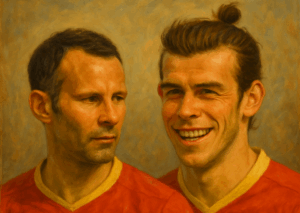
The GOAT of Italy’s World Cup Cinderella Stories?
The World Cup is more than just a football tournament. It is a grand stage that creates national narratives, gives birth to icons of an era, and sometimes, changes a single player’s destiny for eternity. The pantheon of Italian football is engraved with countless great names, but there are two strikers who shone most brightly in the crucible of the World Cup: Paolo Rossi of 1982 and Salvatore “Toto” Schillaci of 1990.
Rossi was the ‘savior’ who, after falling from grace due to a football scandal, made a dramatic comeback on the World Cup stage to bring his nation the title. In contrast, Schillaci was the ‘revelation’ who led the host nation Italy’s dream with an unexpected scoring spree. How did two strikers who walked completely different paths come to hold an equally immortal place in the hearts of the Italian people? This will be a journey to find the answer to that question.
1. Portraits of Two Strikers: Different Paths, Same Summit
Paolo Rossi: The ‘Ghost’ Who Mastered Space
Paolo Rossi’s greatness lay in his football intelligence rather than his physical abilities. He was not a player with explosive speed or overwhelming physique, but he was more adept than anyone at smartly reading and exploiting space.
- Early in the 1982 World Cup, the press criticized him as a “ghost aimlessly roaming the pitch.” Paradoxically, this expression captured the essence of his playing style. He would appear like a ghost, catch the defense off guard, and score.
- He was one of Italy’s most intelligent forwards, a player specialized in perfectly executing his role within the team system and finishing the creative plays of his teammates with a goal.
Salvatore Schillaci: The ‘Toto’ Who Exploded with Passion
Salvatore Schillaci was a completely different type of predator from Rossi. His football was filled with pure passion and fighting spirit. He threatened the opposing goal with aggressive movement and powerful shots. If Rossi hunted with cool intelligence, Schillaci hunted with a boiling, wild instinct.
- His most defining characteristic was the immense energy and emotional expression he exuded on the pitch. In particular, his iconic celebration—roaring with his eyes wide open after scoring a goal—became the symbol of the 1990 World Cup’s ‘Magic Nights’ (Notti Magiche).
2. The Birth of World Cup Legends
Spain 1982: Scandal, Silence, and Salvation (Paolo Rossi)
Rossi’s hero myth began in the darkest of places. In 1980, he was implicated in the ‘Totonero’ match-fixing scandal and received a two-year ban from football. He returned just before the World Cup, but after failing to score in the first three group-stage matches, he was harshly criticized as a “ghost.”
- The final match of the second group stage against Brazil. Italy had to win. Everyone expected an easy victory for Brazil, but it was in this very match that the ‘ghost’ transformed into the ‘savior.’ Rossi scored a hat-trick, securing a 3-2 victory for his team. Miraculously resurrected, he went on to score two goals in the semi-final and the opening goal in the final, gifting Italy its first World Cup in 44 years.
Italy 1990: Magic Nights, An Unexpected Hero (Salvatore Schillaci)
Schillaci’s World Cup journey was a miracle in itself. He was practically a fifth-choice striker with only one international cap to his name just before the tournament.
- On June 9, 1990, in the opening match against Austria, with the score tied at 0-0, Schillaci was substituted in during the 75th minute. Just four minutes later, he scored the winning goal with a thunderous header. This dramatic debut goal instantly turned the unknown striker into a national hero, and he continued to score throughout the tournament, winning both the Golden Ball and the Golden Boot.
3. A Comparison Through Stats and Records
Club and National Team Career Statistics
| Category | Paolo Rossi | Salvatore Schillaci |
|---|---|---|
| Total Appearances (National Team) | 48 | 16 |
| Total Goals (National Team) | 20 | 7 |
| Total World Cup Goals | 9 | 6 |
| Total League Appearances | 251 | 417 |
| Total League Goals | 103 | 154 |
Major Honors Comparison
| Award | Paolo Rossi | Salvatore Schillaci |
|---|---|---|
| FIFA World Cup | Winner (1982) | 3rd Place (1990) |
| European Cup (Champions League) | Winner (1984-85) | – |
| Serie A Title | Winner (1981-82, 1983-84) | – |
| Ballon d’Or | Winner (1982) | 2nd Place (1990) |
| World Cup Golden Ball | Winner (1982) | Winner (1990) |
| World Cup Golden Boot | Winner (1982) | Winner (1990) |
| Serie A/B Top Scorer | A (1 time), B (1 time) | B (1 time) |
4. Legacy and Influence
Impact on Italian Society
- Rossi: The Catharsis that Ended the ‘Years of Lead’
Rossi’s miracle in 1982 had a significance far beyond a mere football victory. At the time, Italy was going through the ‘Years of Lead,’ a period of extreme social and political turmoil. Rossi’s story of overcoming a scandal to save the country was a national hero narrative that restored the pride of a wounded nation. - Schillaci: The Pure Joy of the ‘Magic Nights’
Schillaci’s Cinderella story in 1990 was pure joy and elation for the Italian people. His story was a narrative of the dreams and hopes of an ‘ordinary man’ hero, onto whom every common Italian could project themselves.
Footballing Evaluation
- Schillaci: He is considered the most dramatic example of a ‘one-tournament wonder.’ His story is regarded as the most beautiful upset that the romance and chance of football can create.
- Paolo Rossi: While his World Cup performance was his brightest moment, he was a consistently great player who won both the Ballon d’Or and the European Cup. His legacy is combined with the powerful narrative of a ‘savior.’
Conclusion: Two Timeless World Cup Heroes
Rossi’s story is a grand epic. Universal themes of sin, punishment, and redemption are woven into his football life. His resurrection was synchronized with the revival of a nation, and thus his myth carries a weight that transcends time.
Schillaci’s story is a beautiful fairytale. The journey of an unexpected, unknown player becoming the protagonist on the most brilliant stage is the purest form of fantasy that football can offer. His story is a miracle created by chance, not destiny.
In conclusion, asking who was greater is meaningless. Rossi and Schillaci show two different faces of Italian football. One is the face of a hero who shouldered the weight of history and forged his own destiny. The other is the face of an ordinary man who defied all expectations and turned a dream into reality. Their contrasting legends will be forever remembered as the most perfect examples of how football can change an individual’s life and, furthermore, shape a nation’s collective memory.
To this day, both players are remembered by Italian football fans as eternal goalscorers and symbols of the World Cup.




